
Clans of Caledonia
By suayarcher
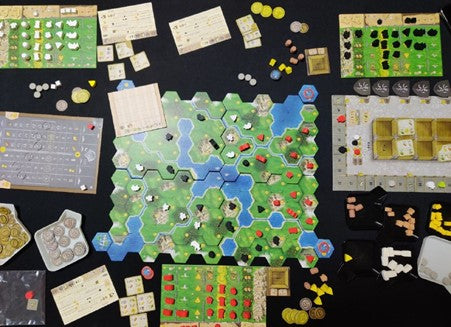
Clans of Caledonia
What is it about / Mechanics of the game / How to play:
Clans of Caledonia (CoC) is an economic game where players will aim to optimise their actions by building, upgrading, trading or fulfilling exports. The aim of the game is to build your units to get sufficient resource each round to sell for more money (money is required to do most your actions) or to fulfil the contracts to get victory points. That said, having a huge stockpile of resources also generates victory points too. The player with the most victory points at the end of the game win.
During their turn, players choose one of eight different actions. That sounds like a lot, but it quite intuitive. Actions can consist of trading one resource to another, taking a contract, fulfilling a contract, putting a unit onto the main board, upgrading or simply pass. To start, players first need to understand the idea of basic units and resources and upgraded units and resources. Basic units such as sheep, cows and wheat fields when built can produce basic resources (wool, milk and grain) and can be converted, or upgraded, into processed resources. Upgraded units such as cheese factories, bakeries and distilleries are required to convert basic resources into processed resources (cheese, bread and whisky). Players do not need to have a basic unit built first before building an upgraded
unit. As long as players have the basic resources (possibly bought from the market) in their stock, players are free to convert these basic resources into processed resources for use.
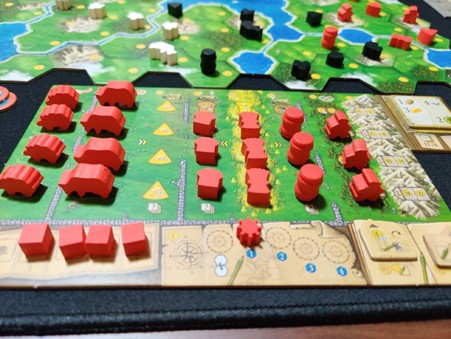
Someone is definitely monopolising the cheese industry!
To increase efficiency, players can upgrade their shipping reach (to reach further across water bodies), hire more merchants to make buy or sell resources, or upgrade their worker’s efficiency to produce more money.
What makes CoC an economic game is the element of a market. Resources can be bought or sold and every time a transaction occurs, the price changes. Players must keep a close watch on the prices of these resources and as the saying goes, buy low sell high. The market can influence a player’s strategy and their plans to build a specific basic or upgraded unit. If grains are currently expensive, it may make sense to build a wheat field to produce wheat for sale. If processed resources are also expensive, players may want to adapt and build upgraded units instead and buy basic resource to convert them into processed resources for sale. Processed resources sell almost twice the price of basic goods and players can do well if they can catch the market at the right prices.
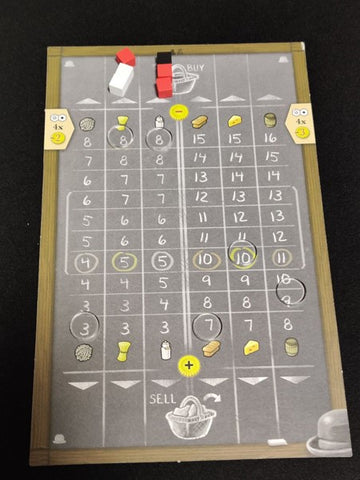
Wow. Someone’s hording the grains and the milk!
Apart from doing that, players can also fulfil export contracts, usually requesting for a combination of basic or processed resources, and in exchange, get rewarded with money, end game victory points, bonus upgrades, or building on a land for free. Export contracts, for most of them, do not seem like a fair exchange, but it has an interesting component to it. Fulfilling export contract increases the value of these three imported goods: cotton, tobacco and sugar cane. At the end of the game, these imported goods will award victory points to players who have fulfilled any contracts containing these goods. However, the kicker is, more you import these good, the lower in VP it’ll be. Hence, the least imported good will be worth 5 victory point each, and the most common imported good will be worth 3 VP each. Players now have another layer of consideration to make before choosing and fulfilling contracts. Fulfilling the easiest one might very well shift a certain imported good from being the rarest to the most common one, but if players were to pick another, they could be stuck with that contract with no ability to fulfil it.
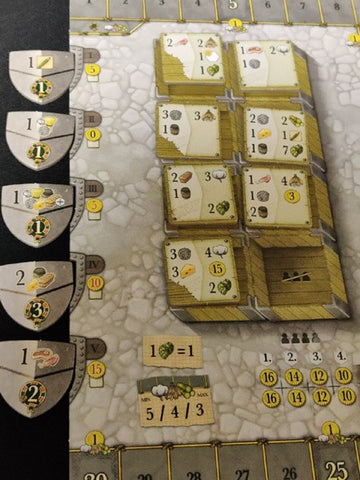
Players will take turn committing to one action until everyone passes and then the round will end. With just 5 rounds in total, players will aim to build, convert, fulfil contracts, and amass the most VP to emerge victorious amongst the others.
Caveat: My reviews are based on my playstyle and will differ from player to player. What I dislike may be your numero uno when it comes to choosing board games. So read and assess it for yourself.
What did I like about CoC?
Every clan is unique and special. One thing that I did not talk about was asymmetric player abilities. Starting from the last player, every player will choose one clan with a unique ability. Each of these abilities make said clan more effective in certain actions. It can be selling certain goods at price not influenced by the market, or getting cheaper upgrades, or having a unique placement style for their workers. All of these are quite rule breaking and can be very fun. Players are encouraged to use their clan’s abilities to their benefit instead of ignoring it and going for a fixed strategy. First timers to CoC can always ignore these abilities and play a symmetric game too.

Replayability for this game is high due to the need to adapt. What makes CoC fun is the way how each player strategise their game. This can be due to the contracts they’re trying to fulfil, the kind of engine they would like to build. All paths affect the market, the state of the game board and the way each player would have to interact with one another. During the game, players may find themselves relying on each other, or in some games, players can aim to be self-sustaining and not benefiting from one another. All strategies are viable and the variability to win CoC is never defined and repeated over multiple games. Players are also incentivised to capitalise on their clan’s abilities, their opponent clan’s abilities and that itself can change the way players play CoC.
What am I neutral about CoC?
Math, math and more AP. There is A LOT of counting in CoC. You have to count if you have sufficient money to take certain actions. You have to count the amount of VP each imported good may provide. You have to count the settlements you have for end game scoring. You have to count EVERYTHING. And this conclusively leads to quite an amount of downtime and analysis paralysis (AP). Thankfully, the players I played with didn’t AP much and it made CoC a more positive experience for me. I like counting and in an economic game, you can expect yourself to be counting something, right? But I can foresee CoC being a game with long downtime when players try to be efficient with their resources and VP and mind map out 230284 different variations before committing to one action.
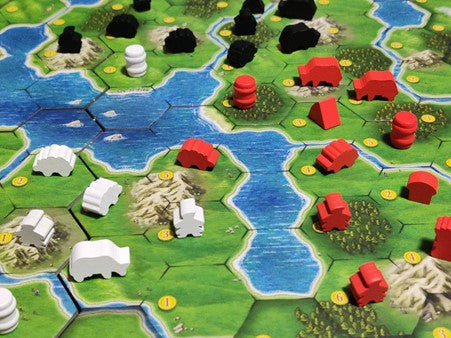
What did I not like about CoC?
CoC can be a solitaire game with occasional player interaction. CoC can be quite a solitaire affair actually. Indirect interaction is evident in this game, but most of the time players are very focused on their player boards and the kind of engine they would like to build. Only when they are in need of a certain resource then would they look at the main board or other players’ boards and check if there is an opportunity for them to attain said resource. Most of a player’s actions will mostly likely not affect another player’s ability to build, produce or upgrade. However, with that said, I do enjoy the indirect interaction CoC brings. Especially towards end game scoring, neighbouring bonus and the market influence during trades. These are what bumps CoC up a point to become a fun game for me.
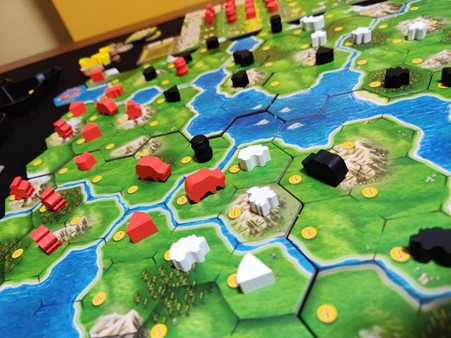
Punishing and no way to recover. CoC can be a punishing game. Apart from the cute animal meeples and factories, taking a wrong move like picking a wrong contract can set a player miles behind other players with little they can do to recover and catch right back. What CoC tries to achieve is the ability for any player to be self-sustaining and purchase their required goods off the market. However, that can be expensive and can set players a few steps backward. With money being a very very very important resource, unnecessary and unthoughtful spending can really drive one player out of the running very early in the game. CoC is definitely a game about min/maxing and a player who does well in that, will usually always win.
Conclusion
Clans of Caledonia is an easy to teach, medium-weight economic game that I would be able to easily pull out to teach and play. It is very easy to get into with simple and intuitive set of rules and CoC offers a fair amount of considerations and strategy planning for players. Gameplay is intuitive and smooth, and the first game should take about 2 hours and will sit comfortably at 1.5 hour with experienced players. CoC provides a very satisfying feel when resources are produced, converted and fulfilled, but it is a game shining as a jack of all trades rather than one which a unique special mechanism that stands out from other economic games.
Would I recommend this game? Yes, it is a good economic board game that does not overstay its welcome.
Would it stay in my shelf? 60% yes. It is more solitaire and calculative (aka Euro) than I expected but because of its ease of teach and play, I will pull out CoC to play when I want to play an economic game.

Natalie Zick
Hello, I’m Natalie from Social Buzzzy here. I’ve come across a revolutionary tool for Instagram success and couldn’t help but share it with you!
Social Growth Engine introduces an amazing tool that skyrockets Instagram engagement. It’s easy:
- Keep focusing on creating fantastic content.
- Affordable at under $36/month.
- Reliable, effective, and Instagram-friendly.
Having seen fantastic results, and I am confident you will too! Boost your Instagram game today: http://get.socialbuzzzy.com/instagram_booster
Cheers your success,
Your friend Natalie